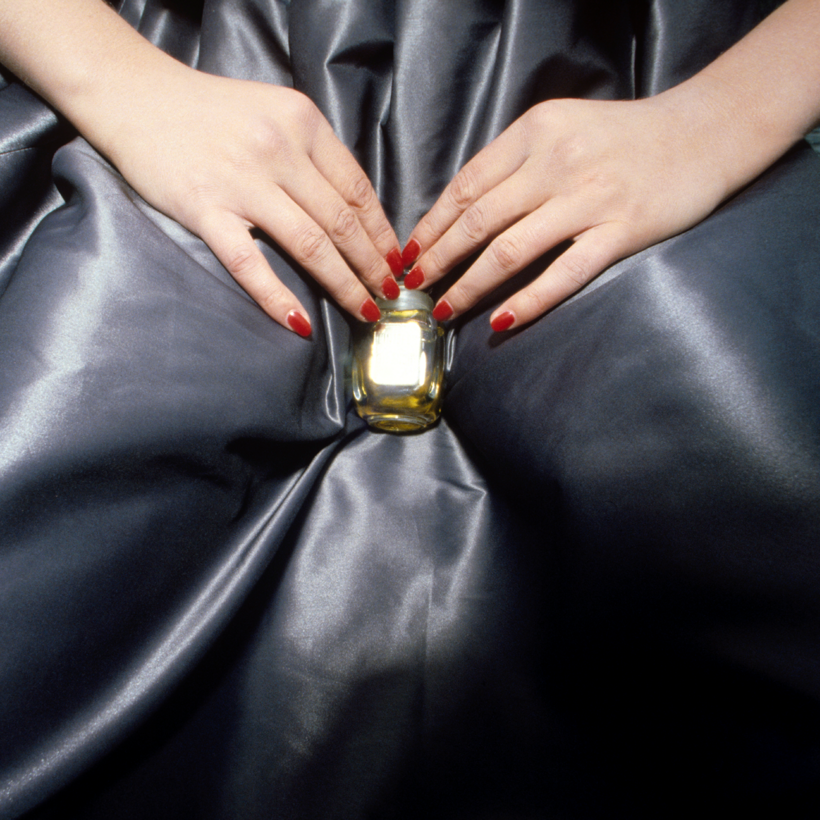Scent has never felt like an accessory to me. It’s neither an adornment nor an optional extra. Instead, it’s profound, intrinsic—my lifeblood in olfactory form.
I’d rather wear nothing than some fey, fraudulent concoction that doesn’t fit. I’d never go near a hothouse flower that reeks of indole, the sickly-smelling chemical that gives white blooms their sexual tang. Someone once doused my wrists in Piguet’s Fracas, and it made me want to hack off both arms.
For perfume to work, one has to be in its thrall, like poor Mary Tudor lamenting, “When I am dead and opened, you shall find Calais engraved on my heart.” Cut me open and you will find Guerlain’s Derby seeped into the marrow of my bones. Isn’t this what the phrase “signature scent” should mean?
Derby was created in 1985 by the great Jean-Paul Guerlain, of Vétiver and Samsara fame. Yet it is J.-P.G.’s swaggering, mock-epic Héritage of 1992 that epitomizes the vaingloriousness of the 1980s. Next to it, Derby is subtle, suggestive, a whisper rather than a shout. An impeccably refined leather chypre (or “moss”) fragrance, redolent of carnation, soft spices, and exotic woods, it dries down to a base of patchouli and birched leather.
Derby has been referred to as “the only male perfume,” the only masculine scent to achieve the elegance and compositional nuance of the feminine classics. To inhale it is to instantly know what this means. It is dimensional, yet coherent, symphonic, and serene. It’s the ultimate second skin.
Derby isn’t something I choose to wear. It is me. Cathy’s words in Wuthering Heights come to mind: “Nelly, I am Heathcliff! He’s always, always in my mind: not as a pleasure, any more than I am always a pleasure to myself, but as my own being.”

Histrionic, yes, but this is the affinity one must have with one’s perfume. It should strike you with: “Good God, here I am.”
I’ve never wanted to gloss over myself with scent, or be rendered easier or more palatable. Instead, I’ve hungered to find myself expressed, writ large, understood in all my complexity—some of it terrible, even to me.
Carnation, for example, can smell revolting, with a rotting-tooth aspect akin to decaying-plant water. However, in the context of Derby, it is sublime, the whole forever greater than the sum of its parts. Ditto, I hope, my own more intransigent elements.
Cut me open and you will find Guerlain’s Derby seeped into the marrow of my bones.
When I was young, I craved passion and immortal love, finding it in the naïvely verdant Must de Cartier II (now discontinued). In my 30s, I left decimation in my wake and wore ballsy, masculine “knicker scents,” such as Knize’s Knize Ten. Ten was a Weimar-era addiction worn by the last kaiser, Marlene Dietrich, and James Dean, revived in 70s S&M clubs by mustachioed leather-lovers. It’s a punishing, distinctly pelvic thrust of amber, cedar, jasmine, carnation, patchouli, castoreum (a leathery emission from the genital scent sacs of the castor beaver), and civet (the fecal paste extracted from the anal glands of the civet cat). It did the trick.
For professional purposes, now I wear Chanel’s Sycomore, a stark, authentic wood with beguiling dankness—yet with an earthy vetiver heart—that manifests as seductive, assertive, assured. However, Derby me is private, tender, and devastating. There is something exquisitely feral and distinctly pelted beneath.
How did I find it? It found me. I grew up with Guerlain and had interviewed Jean-Paul Guerlain himself. Yet it wasn’t until my mid-30s that I discovered Derby, neglected genius that it was. The infatuation was immediate and unswerving, just as wearing it enables me to make cast-iron judgments about those I meet.
Only recently, I encountered a stranger who stood in front of me, lifted the underside of my wrist, and placed it to his lips. “I love you,” he sighed. “I know,” I replied. In it, I love myself.
And the punch line? Derby has been discontinued. I will still have Sycomore, and vials of Ormonde Jayne’s tobacco leaf, suede, and amber Montabaco for travel. There will be Etat Libre d’Orange’s Rien, a misnomer, as it is (almost) everything. And there’s the diminished yet still haunting Cabochard by Grès.
Sycomore will prove a public solace. However, I now have nowhere to put myself. Without Derby, I will be set wandering, forever lost. Unless the gods at Guerlain are tempted to bring it—and thus me—back?
Hannah Betts is a features writer and columnist for The Times of London and The Daily Telegraph




